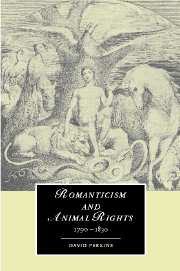Book contents
- Frontmatter
- Contents
- Preface
- Acknowledgments
- 1 In the beginning of animal rights
- 2 Grounds of argument
- 3 Keeping pets: William Cowper and his hares
- 4 Barbarian pleasures: against hunting
- 5 Savage amusements of the poor: John Clare's badger sonnets
- 6 Work animals, slaves, servants: Coleridge's young ass
- 7 The slaughterhouse and the kitchen: Charles Lamb's “Dissertation upon Roast Pig”
- 8 Caged birds and wild
- Notes
- Bibliographical essay
- Index
- CAMBRIDGE STUDIES IN ROMANTICISM
8 - Caged birds and wild
Published online by Cambridge University Press: 22 September 2009
- Frontmatter
- Contents
- Preface
- Acknowledgments
- 1 In the beginning of animal rights
- 2 Grounds of argument
- 3 Keeping pets: William Cowper and his hares
- 4 Barbarian pleasures: against hunting
- 5 Savage amusements of the poor: John Clare's badger sonnets
- 6 Work animals, slaves, servants: Coleridge's young ass
- 7 The slaughterhouse and the kitchen: Charles Lamb's “Dissertation upon Roast Pig”
- 8 Caged birds and wild
- Notes
- Bibliographical essay
- Index
- CAMBRIDGE STUDIES IN ROMANTICISM
Summary
The plea for kindness to animals extended also to birds, the most familiar and loved of wild animals. A typical burst of rhetoric, from James Grahame's The Birds of Scotland, affirms that God “who hears the heavenly choirs” listens with equal pleasure to “the woodland song.” Protest on behalf of wild birds, especially in poems and in literature for children, focused on the taking of eggs, nests, or nestlings of wild birds and the keeping of caged birds as parlor ornaments and pets. Song birds were also eaten, needless to say. In the 1860s Henry Mayhew estimated that 300,000 larks were sold annually for food in the London market. Georgian cookbooks include recipes for roasting, spitting, or stewing blackbirds, thrush, lapwings, magpies, larks, sparrows, and woodpeckers. Frequently they were served on toast. Various birds, notably sparrows and jays, were viewed as agricultural pests and a bounty might be paid for their corpses. However, these practices did not disturb reformers as much as taking nests and caging. Their protest was part of the matrix of famous high Romantic poems such as Wordsworth's “To a Cuckoo,” Shelley's “To a Skylark,” and Keats's “Ode to a Nightingale.” In these poems, birds are elusive and inviolable. They represent a nature man cannot subjugate or harm, the compensatory dream of Romantic poetry.
The hedgerows and heaths, groves and fens of England swarmed with boys. At least, the children's literature of the age leaves this impression.
- Type
- Chapter
- Information
- Romanticism and Animal Rights , pp. 130 - 147Publisher: Cambridge University PressPrint publication year: 2003

